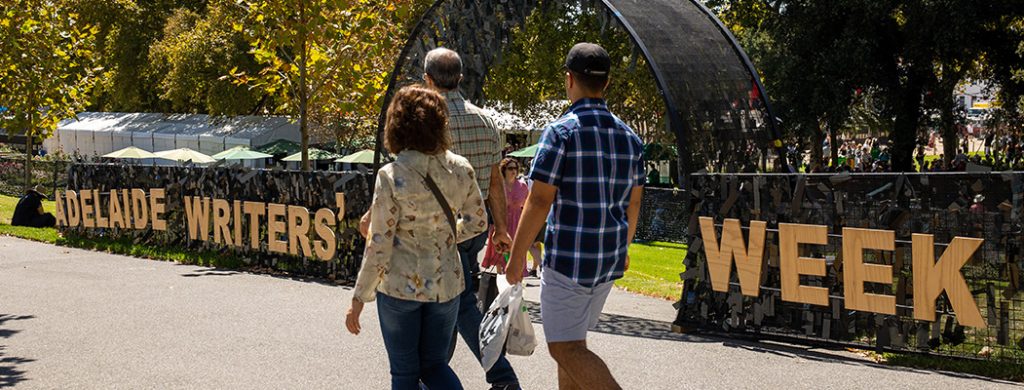IN THE MEDIA
The excuses of Adelaide Writers’ Week defenders hide an ugly truth
March 10, 2023 | Colin Rubenstein

An edited version of this article was published in the Daily Telegraph – 10 March 2023
The way organisers of the partly taxpayer-funded Adelaide Writers’ Week have been defending extremist invitees, such as Palestinian author Susan Abulhawa – in spite of her record of vile hate speech against Jews and Israelis – represents a teachable moment.
It offers a prime example of the way antisemitism is excused and even defended in “woke” progressive culture, as long as it is conflated with criticism of Israel – especially if the offender is Palestinian.
Abulhawa, who was flown in to participate in three sessions during the event this week has form. She keeps a picture above her desk of Palestinian terrorist Dalal Mughrabi – one of the perpetrators of the infamous 1978 Coastal Road Massacre, which saw the slaughter of 38 Israeli civilians.
She also defends Russia’s invasion of Ukraine by employing antisemitic rhetoric to attack Ukrainian President Zelensky.
She has made social media posts calling Israelis “worse than Nazis”; saying Israel is “demonic… spawned by devils” and its inhabitants a “nation of degenerates”, while strongly implying all Israelis are legitimate targets for violence.
Israel is home to approximately half of the world’s Jewish population. One reason Nazi analogies, no matter how ludicrous, are deployed in relation to Israel, is because they are particularly hurtful to Jews – who lost almost half their worldwide population to Nazism. This is why the widely accepted International Holocaust Remembrance Alliance (IHRA) working definition of antisemitism views equating Israelis with Nazis as, prima facie, raising questions about antisemitic motives.
The defence of Abulhawa being invited into Australia, despite her doubling down on her hate speech towards Jews in social media posts ahead of Writers’ Week, is more evidence of the normalisation of antisemitic discourse in Australia and around the world.
When pressed in an interview with Radio Adelaide to defend the decision to invite Abulhawa, Writers’ Week Director Louise Adler said, “our business is to operate not a safe space, but an open space in which ideas that might be confronting, disturbing, provocative are debated with civility.”
However, this isn’t actually true. According to Adler’s own words posted in an open letter on the Writers’ Week home page, this year’s event actually seeks to shut down debate on unspecified issues.
“The thread [of Writers’ Week],” Adler wrote, “is the notion of truth – truths we acknowledge, truths we feel are debatable and those beyond debate.”
In this year’s Writers’ Week, at least ten of the writers are listed as Palestinians, and several others are virulent anti-Israel activists. No Jewish Israeli writers were participating, nor, to our knowledge, any author who has defended Israel in their writing or has the expertise to offer attendees anything counter to the Palestinian narrative. It would appear that the Palestinian narrative counts as something “beyond debate” to the organisers.
Thus a session at the Writers’ Week’s opening weekend, titled “Authors Take Sides”, resembled a rally for the Palestinian cause, in which Israel was relentlessly vilified by all four panellists, to a cheering audience.
On Tuesday, Palestinian ‘truth-tellers’ received top or exclusive billing in four consecutive sessions, spanning five hours. Typical is “Literary Worlds” – which invites festival attendees to “Explore the power of literature to reimagine what has been distorted in the real world. Nowhere is this distortion more apparent than in relation to Palestine. Can literature reveal what has been suppressed to narrate the history of dispossession endured by generations of Palestinians?”
And while Abulhawa attracted the most criticism ahead of the event, she is not alone among the Palestinian invitees to have engaged in hate speech. For example, in April 2020, at the start of the pandemic, Ramzy Baroud accused “racist Israelis” of “deliberately trying to infect Palestinians with… Covid-19.” Meanwhile, Mohammed El-Kurd has evoked antisemitic tropes, accusing Zionists of having “an unquenchable thirst for Palestinian blood,” among other ugly smears.
Palestinian authors, of course, can and should have a place in Writers’ Week and similar events – along with Israelis and writers from around the world. However, a line must be drawn that excludes people from any background who engage in hate speech – with no exceptions based on sympathy for a particular cause.
Yet in the “woke” left, it is increasingly argued that haters like Abulhawa deserve a pass just because they mainly hate Israel, and use the words “Israelis” or “Zionists”, not “Jews”, when spreading timeless slurs.
The test should be whether their speech would be acceptable if it was framed against any other people besides Jews and Israelis.
This year’s Adelaide Writers’ Week deserves to be called out for what it is on this contentious issue: a taxpayer-funded source of one-sided propaganda that can only serve to misinform people, breed hatred, and undermine support in Australia for a genuine, negotiated two-state resolution of the conflict between Palestinians and Israelis.
Unwavering Palestinian rejectionism and, frequently, antisemitic hate, are the main reasons such a resolution has not yet been advanced. The Adelaide Writers’ Week festival seems to have deliberately sought to amplify and reinforce these destructive forces with taxpayer funds – and that is the real “truth”, despite the excuses of the festival’s organisers.





